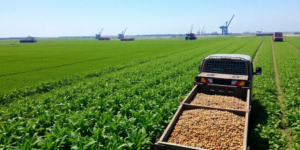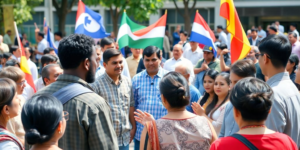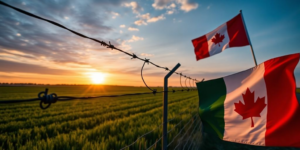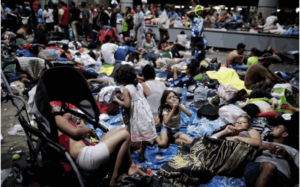‘Alarming’ Rise In Climate Disasters In Brazil: Study 51
Brazil witnesses ‘alarming rise’ in climate disasters: study 15
Impact of Climate Disasters on Brazil’s Economy
Rising Economic Costs
Brazil’s economy has been hit hard by the increasing number of climate disasters. Over the past few decades, the financial toll has surged, with damages estimated at $88.4 billion between 1995 and 2023. This spike in economic losses highlights the growing impact of climate change on the nation’s financial stability. From droughts to floods, each disaster brings a hefty price tag, affecting not just immediate recovery efforts but also long-term economic growth.
Impact on Agriculture and Livelihoods
The farming part of Brazil’s money-making skill is vitally important but really gets hit hard by “climate change”. When the weather gets unusual, it destroys the timing for growing things, which means farmers get less out of their fields and it costs them more. This is abominable news for not only the farmers but also makes food prices go up and it’s harder to find food everywhere in Brazil.
With awful weather events happening more often, Brazil’s ability to produce enough food keeps getting pressured more and more, putting both the chance to have enough food to eat, and “the country’s financial situation, at risk”.
Infrastructure Damage and Recovery
Climate disasters are really messing up Brazil’s infrastructure. Things such as roads, bridges, and public utilities often get destroyed by extreme weather, ending up with expensive repairs and upgrades. Because these fixes take a lot of time and money, Brazil has to take resources away from other important development projects. This entire cycle of damage and repair is making it utterly hard, or difficult, for Brazil to move ahead—both “economically and socially”—since the money that could help the country grow is being spent on fixing what’s broken instead.
Long-term Economic Implications
Addressing the challenges of climate disasters in Brazil is of the very highest importance because these disasters have become more severe in the last few decades, causing major economic losses. These events are happening more often and with greater strength, putting “Brazil’s economic stability” at risk. They make it more expensive for businesses to run, cause insurance costs to go up, and make people think twice about putting money into areas that could be hit by these disasters.
Because of these issues, Brazil could see its economic growth slow down unless it starts putting money into ways to deal with this situation and protect its economy. It’s very important for Brazil to focus on strategies that will help it recover from these disasters and keep its economy safe.
Role of Brazil’s Government and UNESCO in Addressing Climate Change

Government Initiatives and Policies
Brazil’s government has been actively working to combat climate disasters, which have been on the rise in recent years. The government has rolled out various initiatives aimed at mitigating the effects of these disasters. Policies focused on reducing carbon emissions and protecting natural resources are at the forefront. These efforts are critical in addressing the challenges posed by the increasing frequency and intensity of climate-related events in the country.
UNESCO’s Involvement and Support
UNESCO has been a key partner in Brazil’s fight against climate change. The organization has supported the country’s efforts through funding and expertise, helping to implement projects that enhance “resilience to climate impacts”. UNESCO’s involvement underscores the importance of international collaboration in tackling global environmental issues.
Collaborative Efforts and Partnerships
The collaboration between Brazil’s government and UNESCO highlights the power of partnerships in addressing climate change. These efforts are part of a broader Global Initiative for Information Integrity on Climate Change, which aims to improve data accuracy and transparency. Such partnerships are essential for developing effective strategies to combat climate disasters in Brazil and beyond.
Challenges in Policy Implementation
Despite these efforts, Brazil faces significant challenges in implementing climate policies. Bureaucratic hurdles and limited resources often impede progress. Moreover, the vast geographical diversity of Brazil, from the bustling city of Sao Paulo to remote rural areas, presents unique challenges in policy application. Overcoming these “obstacles” is crucial for Brazil to effectively address the impacts of climate change.
Scientific Insights from the Federal University of Sao Paulo
Research Findings and Data Analysis
The researchers at the Federal University of Sao Paulo have been very concentrated on thinking through the complexities of the numbers behind “climate disasters” in Brazil. They found something very worrying: From 2020 to 2023, Brazil saw an average of 4,077 disasters related to the climate every year. That’s a very big jump from the average of 2,073 disasters they were dealing with each year from 2000 to 2019.
This major increase shows just how much harder the environmental problems in Brazil are getting. They really dug into all kinds of disasters such as droughts, floods, and storms to see how often they happen and what effects they have.
Correlation with Ocean Surface Temperatures
One of the standout revelations from the study is the link between rising ocean surface temperatures and the increased frequency of climate disasters. This connection suggests that as the oceans warm, the atmosphere holds more moisture, leading to more intense weather patterns. The study emphasizes that the warming oceans are not just a distant concern but a present-day reality affecting the Brazilian climate.
Implications for Future Climate Predictions
The study’s findings have significant implications for predicting future climate scenarios in Brazil. With the observed trends, researchers warn that without intervention, the frequency and intensity of these disasters are likely to increase. These insights are crucial for developing strategies to mitigate future risks and adapt to the changing climate.
Recommendations for Further Research
The Federal University of Sao Paulo’s researchers stress the importance of ongoing research to better understand the dynamics of climate change. They call for more comprehensive studies that consider various environmental factors, including ocean temperatures and human activities, to refine predictive models. Such research is vital for crafting effective policies and solutions to combat the adverse effects of climate change in Brazil.
Regional Variations in Climate Disasters Across Brazil

Impact on Sao Paulo and Surrounding Areas
Sao Paulo, Brazil, is a major city that has its own problems with weather disasters. The location gets a lot of heavy rain, which causes very bad floods and messes up people’s day-to-day activities. Roads can turn into waterways, which makes getting around extremely hard. These constant floods damage things such as roads and buildings and can make people sick because the water becomes dirty.
Nearby places are affected too, as landslides happen more often, especially where it’s hilly. These landslides are terrible—they can destroy houses and block off important services people need.
Challenges in the Semi-Arid Regions
Water is utterly hard or difficult to come by in the semi-arid parts of Brazil, making life tough for everyone there. These spots are no strangers to not having enough rain, but now they’re dealing with droughts that go on for a very long time and are significantly worse than before. This makes growing food very hard, putting farmers in a difficult situation financially–and making it hard for people to get enough to eat.
People in these areas have to go a long distance just to get water for their everyday needs. The situation shines a bright spotlight on how abominable climate change is, turning every day into a conflict just to make it through.
Flooding and Storms in Coastal Areas
The economic impact hits hard, especially on tourism and local businesses, because storms are becoming harder to predict and more frightening. This unpredictability makes it very hard for people living there to be ready for what’s coming. Towns and cities by the sea in Brazil have a hard time with the risk of both erosion and flooding.
With the sea levels going up and storms hitting harder, homes and even entire areas are in danger of being wiped out. This issue highlights how important it is to have good city planning strategies to deal with these problems. The coast of Brazil is dealing with some serious nature issues, with land disappearing and a large amount of places facing major risks.
Droughts and Water Scarcity Issues
Things have gotten pretty abominable because of the droughts happening more often and stronger all over Brazil. It’s really worrying, especially in places where farming is of major importance. Without enough water, farmers just can’t stay on top of growing plants, which puts their jobs and money at risk. This problem is not only simply about them, though.
When there’s less food, prices go up, and then people can’t afford to buy what they need, ending up with shortages. Trying to think through how to manage the water better is vitally important, but with the weather changing a lot, it’s seriously hard to do. We really need to come up with some sharp and informed new ways to deal with this situation and work together so everyone has the water they need.
Conclusion
Brazil is in for a rough time ahead because of many climate disasters mounting. The data shows us something important, and it is not looking good. It feels as if the Earth is sending us a message that we need to open our eyes, and that message is getting louder every year. In the last 20 or so years, the average number of disasters has almost doubled, indicating that we really need to do something different.
This study is a major indication that climate change isn’t simply something we have to worry about in the future. It’s already here, and it’s hitting us hard. Especially now that Brazil is getting ready to host COP30, it’s probably time to really try harder. We can’t only dwell in place, hoping things will get better on their own. We need to start taking action–and making changes now, otherwise, things are going to get worse even more.














4 comments